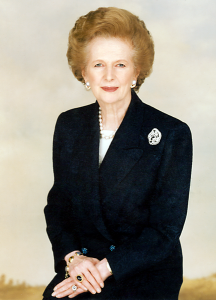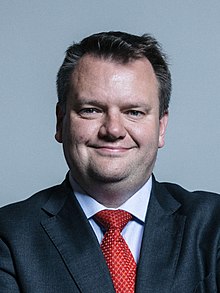Margaret Thatcher – 1986 Statement on Westland
Below is the text of the statement made by Margaret Thatcher, the then Prime Minister, in the House of Commons on 23 January 1986.
With permission, Mr. Speaker, I wish to make a statement on the outcome of the inquiry into the disclosure of certain information in my hon. and learned Friend the Solicitor-General’s letter of 6 January.
As the House knows, the chairman of Westland plc, Sir John Cuckney, wrote to me on 30 December 1985 asking whether Westland would no longer be considered a European company by the Government if a minority shareholding in the company were held by a major international group from a NATO country outside Europe.
This question was of fundamental importance to the company in making its decision as to what course it was best to follow in the interests of the company and its employees. It was therefore essential to be sure that my reply should be in no way misleading to anyone who might rely upon it in making commercial judgments and decisions.
The reply was accordingly considered among the Departments concerned, and the text of my letter of 1 January 1986 was agreed in detail by my right hon. and learned Friend the Secretary of State for Trade and Industry, my right hon. Friends the then Secretary of State for Defence and the Chief Secretary to the Treasury, and finally by my hon. and learned Friend the Solicitor-General.
My letter was made public.
Two days later, on 3 January, my right hon. Friend the then Secretary of State for Defence replied to a letter of the same date from Mr. Horne of Lloyds Merchant Bank asking him a number of questions, covering some of the same ground as my own reply to Sir John Cuckney. The texts of the letters became public that same day.
My right hon. Friend’s reply was not cleared or even discussed with the relevant Cabinet colleagues. Moreover, although the reply was also material to the commercial judgments and decisions that would have to be made, my hon. and learned Friend the Solicitor-General was not invited to scrutinise the letter before it was issued.
On the morning of 6 January, my hon. and learned Friend the Solicitor-General wrote to my right hon. Friend the then Secretary of State for Defence. He said—and I quote:
“It is foreseeable that your letter will be relied upon by the Westland Board and its shareholders.
Consistently with the advice I gave to the Prime Minister on 31 December, the Government in such circumstances is under a duty not to give information which is incomplete or inaccurate in any material particular.”
The letter continued:
“On the basis of the information contained in the documents to which I have referred, which I emphasise are all that I have seen, the sentence in your letter to Mr. Home does in my opinion contain material inaccuracies in the respects I have mentioned, and I therefore must advise that you should write again to Mr. Horne correcting the inaccuracies.”
That is the end of the quotation.
I have quoted extensively from the letter which, as hon. Members will know, was published a week ago. As I have already indicated, it was especially important in this situation for statements made on behalf of the Government, on which commercial judgments might be based, to be accurate and in no way misleading.
That being so, it was a matter of duty that it should be made known publicly that there were thought to be material inaccuracies which needed to be corrected in the letter of my right hon. Friend. the Member for Henley (Mr. Heseltine) of 3 January, which, as the House will recall, had already been made public. Moreover, it was urgent that it should become public knowledge before 4 pm that afternoon, 6 January, when Sir John Cuckney was due to hold a press conference to announce the Westland board’s recommendation to shareholders of a revised proposal from the United Technologies Corporation-Fiat consortium.
These considerations were very much in the mind of my right hon. and learned Friend the Secretary of State for Trade and Industry when the copy of the Solicitor-General’s letter was brought to his attention at about 1.30 pm that afternoon of 6 January. He took the view that the fact that the Solicitor-General had written to the then Secretary of State for Defence, and the opinion he had expressed, should be brought into the public domain as soon as possible. He asked his officials to discuss with my office whether the disclosure should be made, and, if so, whether it should be made from 10 Downing street, as he said he would prefer.
My right hon. and learned Friend made it clear that, subject to the agreement of my office, he was giving authority for the disclosure to be made from the Department of Trade and Industry, if it was not made from 10 Downing street. He expressed no view as to the form in which the disclosure should be made, though it was clear to all concerned that in the circumstances it was not possible to proceed by way of an agreed statement.
My office were accordingly approached. They did not seek my agreement: they considered—and they were right — that I should agree with my right hon. and learned Friend the Secretary of State for Trade and Industry that the fact that the then Defence Secretary’s letter of 3 January was thought by the Solicitor-General to contain material inaccuracies which needed to be corrected should become public knowledge as soon as possible, and before Sir John Cuckney’s press conference. It was accepted that the Department of Trade and Industry should disclose that fact and that, in view of the urgency of the matter, the disclosure should be made by means of a telephone communication to the Press Association. [Interruption.] Had I been consulted, I should have said that a different way must be found of making the relevant facts known.
The report finds, in the light of the evidence, that the Department of Trade and Industry acted in good faith in the knowledge that it had the authority of its Secretary of State and cover from my office for proceeding. An official of the Department accordingly told a representative of the Press Association of the letter by my hon. and learned Friend the Solicitor-General and material elements of what it said. The company was also informed. The information was on the Press Association tapes at 3.30 pm.
My right hon. and learned Friend the Secretary of State for Trade and Industry was, in my judgment, right in thinking that it was important that the possible existence of material inaccuracies in the letter of 3 January by the then Secretary of State for Defence should become a matter of public knowledge, if possible before Sir John Cuckney’s press conference at 4 pm that day. In so far as what my office said to the Department of Trade and Industry was based on the belief that I should have taken that view, had I been consulted, it was right. My right hon. and learned Friend the Attorney-General has authorised me to inform the House that, having considered the report by the head of the Civil Service, and on the material before him, he has decided after consultation with, and with the full agreement of, the Director of Public Prosecutions and senior Treasury counsel, that there is no justification for the institution of proceedings under the Official Secrets Act 1911 in respect of any of the persons concerned in this matter.
In order that there should be no impediment to cooperation in the inquiry, my right hon. and learned Friend had authorised the head of the Civil Service to tell one of the officials concerned, whose testimony would be vital to the inquiry, that he had my right hon. and learned Friend’s authority to say that, provided that he received full co-operation in his inquiry, the official concerned would not be prosecuted in respect of anything said during the course of the inquiry.
The head of the Civil Service did, indeed, receive full co-operation not only from that official but from all concerned. My right hon. and learned Friend tells me that he is satisfied that that in no way interfered with the course of justice: on the facts as disclosed in the inquiry there would have been no question of proceeding against the official concerned.


